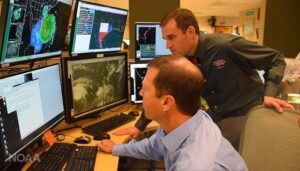Yes, ChatGPT can create weather forecasts, but the real question will be their accuracy.

People have started exploring how to use ChatGPT and other artificial intelligence methods to experiment with forecasts. This is not surprising as we have always needed weather forecasts and humans have used many techniques over the decades. Some of the earliest forms of forecasts were short rhymes, and, although memorable, were often of uneven quality.
Forecasts improved as weather observations became more available and consistent. A statistical forecast uses historical data to project what future weather could be based on what happened in the past with similar conditions. A trend forecast assumes that weather will change based on the movement and approach of current weather features. A trend forecast assumes that although the weather features are moving, they are not otherwise changing. Numerical weather prediction is a basis for today’s modern forecasts, which use mathematical models to predict the weather based on current weather conditions.
ChatGPT, or any AI approach, can forecast weather patterns that are statistically plausible given previous events. AI methods are being developed and applied to radar observations for short-term forecasting of precipitation. Observations of high-quality weather radar are freely available across the U.S. An AI adoption of a trend forecast to radar observations has the potential to account for changing speed, size, intensity, and direction of movement of the storm.
Given the capability of AI to handle large data volumes, upcoming AI weather forecasts are likely to combine numerical weather predictions with current and recent weather observations to make a forecast.
There are risks in relying on AI forecasts. All AI models require data training sets. Those data records might not include extreme events. AI systems can be unpredictable when the existing conditions have never, or rarely, been encountered.
AI weather forecasting requires the same constraints as all forecasts — accurate and consistent observations.
Steve Ackerman and Jonathan Martin, professors in the UW-Madison department of atmospheric and oceanic sciences, are guests on WHA radio (970 AM) at 11:45 a.m. the last Monday of each month. Send them your questions at stevea@ssec.wisc.edu or jemarti1@wisc.edu.

